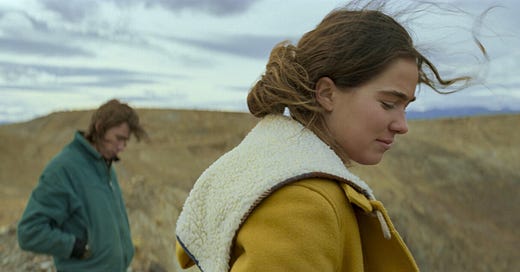Montana Story
Vulnerable lead performances and a truthful emotional core give this otherwise slow and underexplored drama life.
If I have any significant takeaway from Montana Story, it’s that Haley Lu Richardson and Owen Teague are phenomenal actors with a knack for naturalistic vulnerability and should be in more, bigger things.
I’ve known this about Richardson for years now, as her smaller turns in 2016’s Split and Edge of Seventeen and her larger emotional showcase in 2017’s Columbus proved her to be one of the greatest and most under-recognized talents of her age group. Her scrunched-eyebrow, annoyed-grimace despondence is something I can’t say I’ve seen from many other actors in their portrayals of sadness and pain from other actors, but it always feels true in its specificity.
Teague, on the other hand, was new to me (at least consciously—he was in the It films and The Empty Man, which I’ve seen but don’t remember him from) and equally engrossing to watch. He’s got something of an Adam Driver-esque stiffness to him that makes his character feel realistically repressed and awkward.
Montana Story is about Cal (Teague) and Erin (Richardson), half-siblings who’ve gone their separate ways in adulthood, but who are brought back together when their abusive father falls ill and into a coma — presumably, with little time left to live.
The premise is kept simple to make way for the emotional exploration of Cal’s and Erin’s relationship with one another, and with their now-unresponsive father. Their father’s nurse, Ace (Gilbert Owuor) is a convenient and insightful bouncing-board for their confused emotions.
When any combination of the three are onscreen and given the opportunity to open up about their memories and traumatic history, the film is engaging and empathetic, even at times heart-wrenching, thanks to the emotional realism of their performances.
Richardson’s, Teague’s, and Owuor’s acting aside, however, Montana Story is a family-based trauma drama that, while earnest in its emotional truth and tender in how it treats its central figures, never feels like it amounts to much, leaving us with a 2-hour melancholy sit in the plains, staring at mountains and talking about dying dads.
Truthfully, seeing Richardson in this scenario felt like old territory from Columbus, a much more complex and exploratory look at family responsibility.
The film’s slow-moving, distant photography is visually beautiful, but adds to this atmosphere of sad stagnation. To a certain extent, I can accept this overall mood as an intentional creation of directors Scott McGeehee and Dave Spiegel and cinematographer Giles Nuttgens as a way off adding to its emotional center, but when the story introduces threads and resolves them with a shrug, rather than a real climax, it winds up compounding the feeling that nothing is happening.
By the end, Montana Story feels a bit like having watched someone else’s rather difficult therapy session. Emotionally moving at times—sure. Raw and earnest in its conversations about grief, abuse, and the things we owe our family—absolutely! But also… a bit of an aimless ramble about more ideas than it can fully explore.





